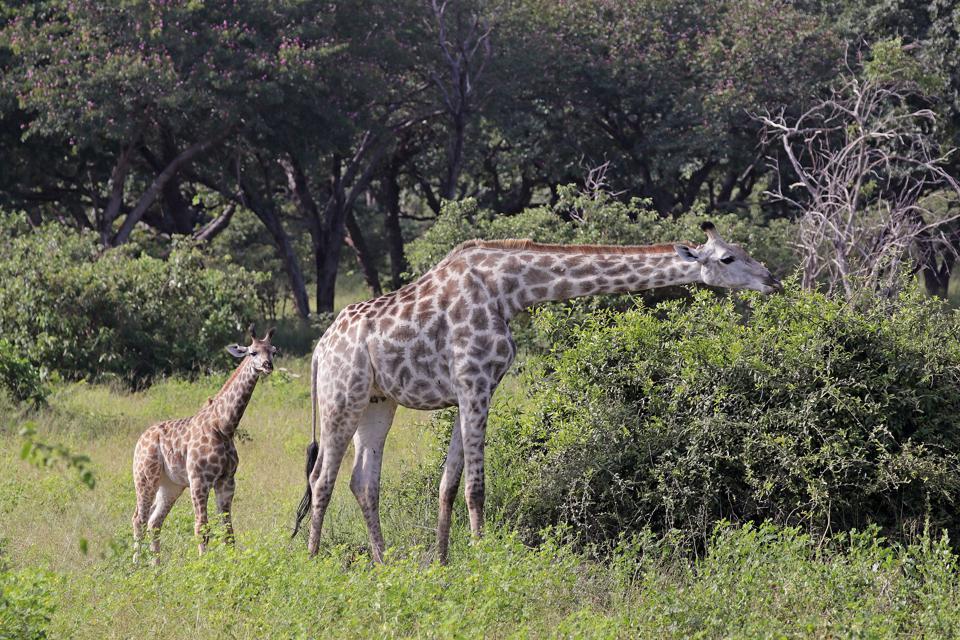Gimli And Nigel, The World's First-Known Dwarf Giraffes, Are Adorable
Language
Reading Level
Listen to Article

Standing over 8 feet tall would be considered intimidating or, at least, respectable for most species. Unless, of course, you are a giraffe — the world's tallest animal — and are surrounded by cohorts who are at least twice as tall! Meet Gimli and Nigel, the world's first-known "mini" giraffes!
The 9-foot-4-inch-tall (2.8 m) Gimli — named after the heroic dwarf in the "Lord of the Rings" trilogy — was first spotted at Uganda's Murchison Falls National Park in 2015, during a routine photographic survey to track animal populations.
“We quite literally did a double-take when we saw this unusual giraffe to make sure that our eyes were not deceiving us," Dr. Michael Brown, a conservation science fellow with the Giraffe Conservation Foundation and the Smithsonian Conservation Biology Institute, told Forbes in an e-mail. Fortunately, the researchers were able to confirm its existence twice again — in December 2016 and March 2017. Dr. Brown estimates that Gimli was about 15 months old at the last sighting.
The even shorter, 8.5-foot-tall (2.5m) Nigel was found at a private farm in Namibia in 2018. Born in 2014, the four-year-old was approaching adulthood when discovered. “While the Namibian farmer had spotted Nigel regularly over the years, it was only after our observations that he realized that Nigel was not a juvenile but a fully grown male giraffe,” said Emma Wells, the Giraffe Conservation Foundation researcher who photographed Nigel. “It is mainly in comparison to other giraffes that his difference in stature becomes obvious.”

The scientists say the two male giraffes sport different body structures. Gimli has an abnormally sized-body with short stubby legs, while Nigel is proportionately small. Dr. Brown told Forbes, “The Ugandan giraffe had shorter metacarpal and radius bones, but its neck was normal-sized for a subadult giraffe. Conversely, the Namibian giraffe had a shorter metacarpal, radius, and neck dimensions than what we would expect for a giraffe of his age.”
While the giraffes comprise two distinct species and are not related to each other, the researchers believe they both suffer from skeletal dysplasia or dwarfism. This genetic disorder causes bones to grow abnormally short. While the condition has been observed in humans and a few domestic animals, such as dogs and pigs, it has never been seen in wild animals. “Instances of wild animals with these types of skeletal dysplasias are extraordinarily rare,” Dr. Brown says.
Since giraffes use their long legs to both flee from and kick predators, the two dwarf animals — especially Gimli, with his stubby legs— are certainly at a disadvantage in the wild. However, Dr. Brown believes that their chances of living a long life look promising given that both have survived the crucial first year. They also happen to reside in areas with low predation rates. We sure hope these adorable animals are around for a long time!
Gimli and Nigel are not the only animals making headlines in 2021. Nieve (Spanish for snow) — Nicaragua's first white tiger born in captivity — is also taking the world by storm. The adorable female cub, born to a pair of yellow-and-black colored Bengal tigers in early January 2021, was rejected by its mother at birth. However, thanks to the loving care of Marina Arguello, who manages the zoo with her husband, Eduardo Sacasa, Nieve is thriving.
The white tiger's pale coloration can be attributed to the lack of the red and yellow pheomelanin pigments that give the animals their distinct orange coloring. It is caused by an extremely rare gene carried by a parent. In Nieve's case, it was from her mother, Dalila, who had inherited the gene from her father, himself a white Bengal tiger.
Resources: Forbes.com, CTVnews.ca, travelandleisure.com

Get the Workbook for this article!
Workbook contains: Article, Reading Comprehension, Critical Thinking Questions, Vocabulary in Context (+ answers), Multiple Choice Quiz (+ answers), Parts of Speech Quiz (+ answers), Vocabulary Game (+ answers)Cite Article
Learn Keywords in this Article
279 Comments
- marinmoris1612almost 2 yearsSo cute
- skyward_flightalmost 2 yearsNieve is so cute!!!!
- littlefox1about 2 yearsTiny Giraffe!!! HeHeHe
- mrtimabout 2 yearsI love the giraffe!
- iheartpuppiesover 2 yearsThat's strange. I don't think a short giraffe will live long. They are tall for a reson.
- urakuaover 2 yearsthe white tiger though
- ilikeanimals123about 3 yearsso cute!
- beefymarshmalowabout 3 yearsthat white tiger is awsome
- thegrizzlyover 2 yearsI live in Nicaragua I've seen this tiger before.
- hxney_secretabout 3 yearsAwwww!
- afg1stfemaleabout 3 yearsCute dwarf girraf.

